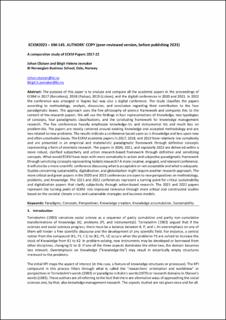| dc.description.abstract | The purpose of this paper is to analyze and compare all the academic papers in the proceedings of ECKM in 2017 (Barcelona), 2018 (Padua), 2019 (Lisbon), and the digital conferences in 2020 and 2021. In 2022, the conference was arranged in Naples as a digital conference. The study classifies the papers according to methodology, analysis, discussion, and conclusion regarding their contribution to the four paradigmatic boxes. The approach uses the five philosophy of science framework and compares this to the content of the research papers. We will use the findings in four representations of knowledge, two typologies of concepts, four paradigmatic classifications, and the concluding framework for knowledge management research. The five conferences heavily emphasize knowledge-itis and instrumental itis and much less on problem-itis. The papers are mostly centered around existing knowledge and accepted methodology and are less related to new problems. The results indicate a conference based upon as-is knowledge and less upon new and often unsolvable issues. The ECKM academic papers in 2017, 2018, and 2019 have relatively low complexity and are presented in an empirical and materialistic paradigmatic framework through definitive concepts representing a form of atomistic research. The papers in 2020, 2021, and especially 2022 are delivered within a more robust, clarified subjectivity and action research-based framework through definitive and sensitizing concepts. What would ECKM have been with more complexity in action and subjective paradigmatic framework through sensitizing concepts representing holistic research? A more creative, engaged, and relevant conference. It will also be a more scientific conference discussing what is acceptable or not acceptable and what is adequate. Studies concerning sustainability, digitalization, and globalization might require another research approach. The more critical and green papers in the 2020 and 2021 conferences are open to new perspectives on methodology, problems, and knowledge. The 2021 and 2022 conferences represent a turning point for critical sustainability and digitalization papers that clarify subjectivity through action-based research. The 2021 and 2022 papers represent the turning point of ECKM into improved relevance through more critical and constructed studies based on the societal climate crisis and sustainable strategies and business models. | |
